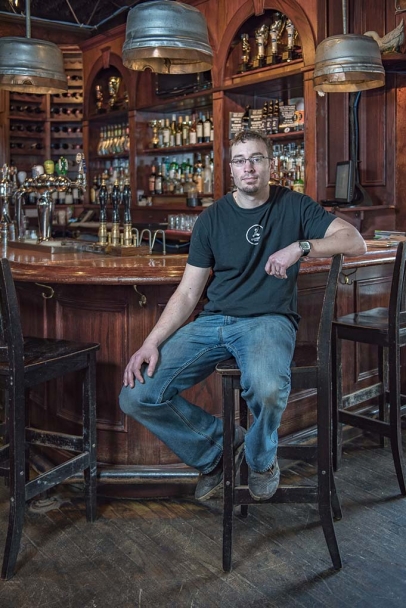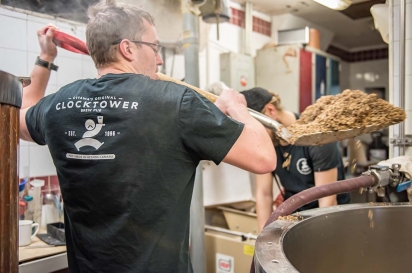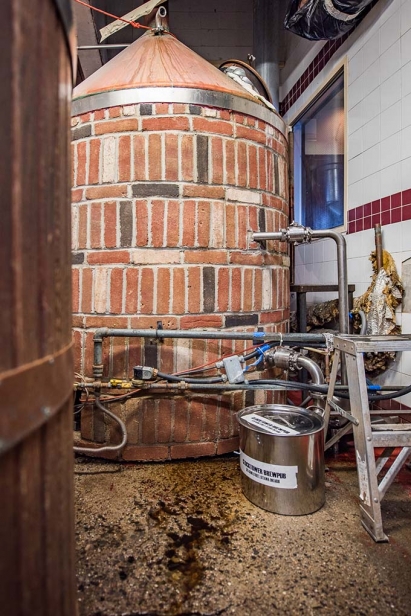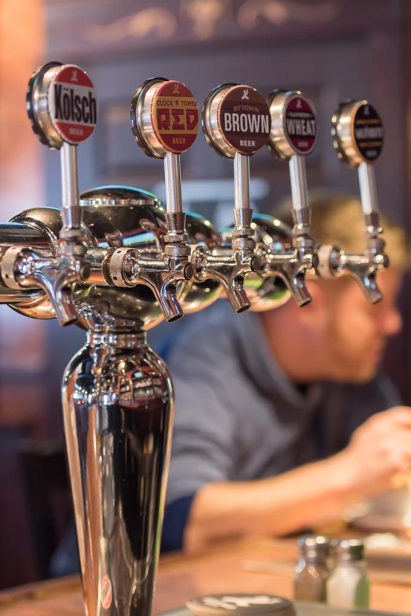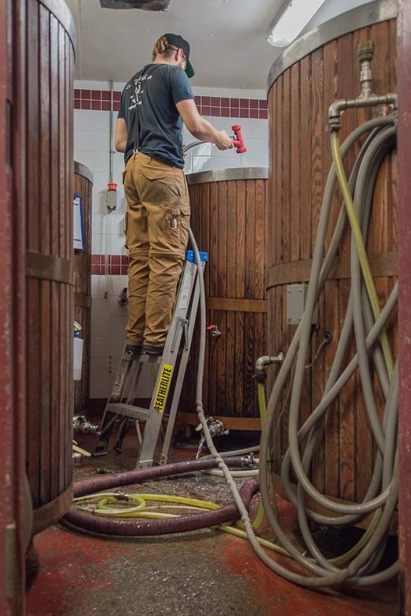Working for Food: Patrick Fiori, Clocktower Brewpub
When a Bavarian Duke sat down to write a recipe into law in 1516, he could not have foreseen that the ruling would ring into the ages. Wilhelm IV's announcement that henceforth beer can only be made with barley, hops and water was to ensure his people did not starve (or thirst) from a lack of bread or beer. The Purity Law, or Reinheingesbot, as it was later renamed by an angry parliamentarian in early 1918, would echo long after the Renaissance, only recently meeting its end in 1987, after nearly five centuries of labyrinthine amendments.
A mere five years after the Duke’s proclamation, the conquistadors of Spain would soon discover a concoction that would challenge their uninitiated palettes. As they bore down on the ancient cultures of the New World, they discovered the Nahua people making their own bioregional brew. Pulque had been made from the sacred maguey plant for more than a millenia. To prepare the tough-skinned succulent for brewing, the Nahua would masticate the plant in yeast rich environments, namely by chewing it and coating the pulverized agave americana with their spit. The cactus-like cud transformed into a thick, frothy sour-tasting beverage, which soon the Spaniards were consuming with gusto.
It is this weird and wonderful history of beer, and its indelible influence on humanity, that has kept Patrick Fiori, the brewmaster of the Clocktower Brewpub in Ottawa, ruminating for as long as he can remember. “The thing about beer is the more you dig, the more fascinating things emerge. Like pulque. It was being made long before distillation made it across the ocean.”
Growing up in Saskachewan, Fiori was drawn to beer culture from an early age. “My family has been going to the same brewpub, Bushwakker’s, for years. I found the whole concept of the pub really interesting.” Fiori quickly discovered the cultural significance of the public house, and the lively (often political) debate that raged within them, stretched far beyond his hometown of Regina. “Beer is so ingrained in our culture and always has been, whether people want to accept that or not,” he asserts. “After all, it’s just a product, no different than say, yoghurt. But in the right social context, it takes on a whole new meaning.” While the psychological effects of alcohol kept public debate in throes, the grains packed a nutritional punch and the boiled brew obliterated any deadly pathogens lurking in the water. It is no wonder the sustaining effects of beer have fuelled civilizations across the globe. “Not too many foodstuffs have evolved to that point in our history,” Fiori adds.
By the time he was studying biochemistry at the University of Saskatchewan in Saskatoon, Fiori was already toying around with brewing at home. However, it was the science that ultimately laid the foundation for his fu-ture prowess as a brewmaster. “In chemistry, you can’t see the reactions at work. You have to have a nimble mind so you can imagine, ‘Ok, this molecule needs to rotate like this in order for this molecule to do that.’” His chemistry professors called it mental acrobatics — a skill that Fiori would find extremely useful in the future.
Fiori later went on to study at Heriot-Watt University, one of the few schools in the world to offer a Masters in Brewing and Distilling, in Edinburgh, Scotland. There, he learned how to run a brewery, from grain to growler. Returning to Saskatchewan, Fiori met his wife, a physicist, and followed her to Ottawa when she received a job offer. In 2007, Fiori walked into Ottawa’s only brewpub, the Clocktower on Bank Street, and asked for a job.
Eight years later, Fiori has helped the Clocktower Brewpub expand into five locations while closing in on nearly 50 licensees. Taps from Cornwall to Kingston are now pouring his brews, while a contract with Lowertown Brewery has helped keep up with the increased production. Fiori admits the bustling atmosphere is part of why he likes brewing for the Clocktower, “I have never gone a full year where we didn’t change something. A new location, a new product — there is always something happening.”
With the constant momentum, Fiori finds himself more of an over-seer. “I don’t spend as much time brewing as I’d like,” he says while keeping a watchful eye on one of his young assistants in the brew room. The brew room, in full view for patrons of the brewhouse in the Glebe, is more like two chambers, both small and antiquated. One houses a large brick-laid kettle, looming like a medieval oven over the mash tun, where the grains are expunged of their starches. Four oversized barrels sputter with wort and hungry yeasts over in the next room. When a thick cloud of steam billows out of the fermentation room, increasing the relative humid-ity in the cramped space by 15 to 20 per cent, Fiori shakes his head. “In the summer months you actually go outside for relief.”
With eager young brewers more than to happy shovel heavy spent grains and clean up after the feasting microorganisms, Fiori devotes more time to his other projects. “I’m working on a super secret plan for the Clocktower’s 20th anniversary. It’s going to be awesome!” His collaborative projects are, as Fiori puts it, a great way to keep the “creative wheels greased.” “You get to play with ingredients you might have never tried and work with some great people. It’s an exchange of cool.”
For his Whalesbone Oyster Stout, Fiori drew on an old Irish tradition of using oyster shells, provided by the neighbouring seafood magnates, to clarify beer of impurities. Fiori admits traditional methods often pervade his style of brewing but he is not bound by them. “I’m just trying to make the best beer I can by melding together historical roots and new ideas.”
While he respects the breweries that have committed to using only Ontario hops or organic grains, Fiori admits that the industry still has a long way to go. “Hops in Ontario are really starting to take off. And you still have to look to Europe for your malts.” The lack of availability and affordability casts an honest light on what locality means when faced with the reality of the region. As Fiori puts it, Clocktower does what it can. “We know the best thing we can do is work with sustainable businesses and partners.”
One of Fiori’s partners keeps his beer flowing through the food chain. “I was looking for ages for a farmer to collect our spent grains and then I found Ian,” he says, referring to Ian Walker of Mariposa Farm, ”but at first he was skeptical.” It took a number of calls and a few clandestine visits to the brewery after hours before Walker would even meet with Fiori. “I would show up for work in the morning and there would be no sign of the grain or Ian. Then I finally heard from him. He said, ”It’s excellent. Let’s do this.” Since then Walker has been feeding his hens, chickens, geese and the farm’s resident dairy cow, Yoga, with grains from the Clocktower. Besides reducing waste, the benefits of the farmer-brewer relation-ship are far from lost on Fiori. “Aside from grass, spent grains have the highest amount of protein. And the animals love it. Especially when pumpkin ale season rolls around.”
This holiday season, Fiori will be doling out bags of spent chocolate malts to the animals while Clocktower customers get to enjoy the brew. “We’re going the opposite direction than most holiday beers do.” Fiori is releasing a dark ale, rich in flavour but light on the booze, an antidote for the often heavily spiked grogs that tend to knock us off our feet during these festive times. “It’s a mild 3.8 per cent — a shift in how holiday ales have historically been made and a departure from Fiori’s often traditional approach. Holiday seasonals can be upwards of 14 per cent, some of the strongest styles in the world. Perhaps Fiori has unwittingly rung in a cultural change of his own… move over Wilhelm.
Clocktower Brewpub
200 Elgin St., 422 MacKay St., 89 Clarence St., 418 Richmond Rd., 575 Bank St.
Ottawa, Ont. clocktower.ca, 613.233.7849


